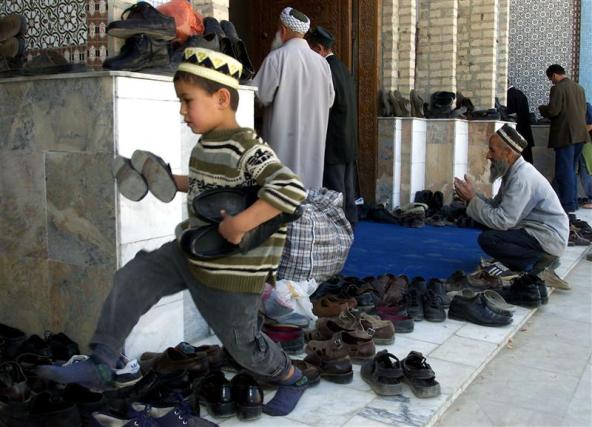
Bill Banning Children from Mosques Adopted in Tajikistan
Publication: Eurasia Daily Monitor Volume: 8 Issue: 124
By:

On June 15, the lower house of the Tajik parliament voted to approve a controversial parental responsibility bill, which has been heavily criticized by local religious communities. Only two deputies from the opposition Islamic Revival Party (IRPT) voted against the bill in the 63-deputy house (www.news.tj, June 15). The bill must now be approved by the upper house and signed by the president to become law, but this is seen as a mere formality.
The law was initiated by Tajikistan’s President Emomali Rahmon during his meeting with the country’s academics and teachers in December 2009. Rahmon described the initiation of the law as an attempt to define the responsibilities and key roles of parents in raising and educating their children. In December 2010, the Tajik president presented a draft bill for public consultation in an effort to ensure broad support for the initiative. According to the president’s press service, the nationwide discussion of the bill resulted in more than 8,000 comments, most of which were incorporated in the final draft. On April 16, Rahmon sent the bill to the parliament (www.news.tj, www.khovar.tj, April 16, 2011).
The new legislation has generated controversy by explicitly barring children under the age of 18 from “participating in the activities of religious organizations,” which include mosques and other places of worship. Local analysts believe that the ban is aimed at preventing Tajik children from becoming radicalized. Presenting the bill in the parliament, Tajik Education Minister Abdujabbor Rahmonov, said: “The draft law allows children that study in religious schools to attend mosques and join religious associations. However, children studying in secular schools are prohibited from doing so before they reach the age of 18.” He also said that children will still be allowed to participate in funerals and attend mosques during official religious holidays (www.avesta.tj, June 15).
Explaining why the ban was initiated, Marhabo Jabborova, the head of the committee for science, education, culture and youth policy in the parliament’s lower chamber, said the government is concerned that “many young people in Tajikistan, instead of attending public schools, attend mosques.” She suggested that the ban will define the responsibility of parents for ensuring that their children do not become radical Muslims (https://www.forum18.org/Archive.php?article_id=1574, May 25).
Tajik legal experts and religious communities have condemned the ban on children’s visits to mosques as unconstitutional and anti-Islamic. Prominent Tajik lawyer and head of the country’s Social Democratic Party (SDPT) Rahmatillo Zoirov suggested that the parental responsibility bill includes some provisions which had already been stipulated in the constitution and the Family Code. At the same time, according to Zoirov, some provisions in the bill violate Tajikistan’s constitution and international human rights obligations (www.news.tj, June 20).
The Deputy Head of the country’s Islamic Revival Party, Umarali Hisaynov, described the new bill as another step in the government’s effort to restrict the rights of religious believers (www.news.tj, June 15). The authorities have recently amended the country’s criminal code, making the opening of illegal religious schools punishable by up to 12 years in jail. Another recent amendment in the legislation has banned Tajik citizens from obtaining religious education abroad without an approval from the education ministry and committee for religious affairs and before graduating from a religious school in Tajikistan.
The heaviest criticism has come from prominent Tajik cleric Hoji Akbar Turajonzoda. Turajonzoda, who had served as a spiritual leader of the Tajik Islamic opposition during the 1992-1997 civil war and the country’s post-war prime minister, said the new bill confronts Tajik Muslims with a difficult choice. “[Muslims] now have to decide whether they want to abide by the will of God or observe this legislation, which is openly against god and Islam.” (www.avesta.tj, June 16). According to the cleric, the authorities’ recent policies which aim to restrict the role of Islam in the country have been even more oppressive than in the officially atheist Soviet Union (www.regnum.ru, June 16).
The ban on children attending places of worship has also drawn criticism from the country’s non-Islamic religious groups, including Russian Orthodox Christians and the Jewish community (www.rferl.org, February 17; https://www.forum18.org/Archive.php?article_id=1574, May 25).
Besides restricting children’s access to religious institutions, the new bill also makes parents responsible for giving their children a “proper name,” which should reflect “national values,” and for disallowing their children to wear excessive jewelry, tattoos, and use mobile phones in schools. The bill also prohibits young people under the age of 20 from attending restaurants and clubs at night time and purchasing alcohol.




